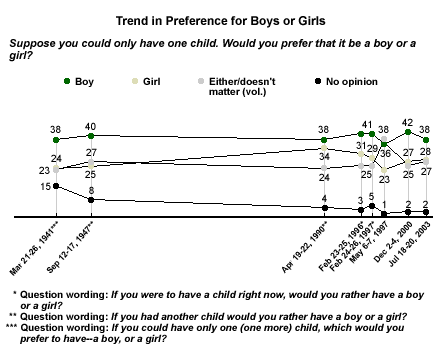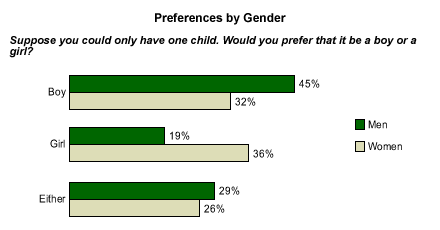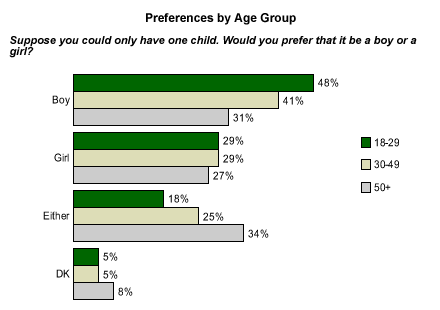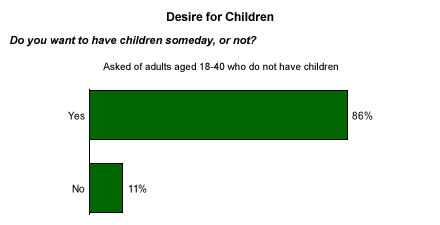As he has for the past 60 years, "Junior" still reigns when it comes to Americans' preferences for a son or daughter. When Gallup recently asked Americans whether they would prefer a boy or a girl if they could have only one child, 38% say they would prefer a boy, 28% say a girl, and 27% say it would make no difference.

Men Want Sons
A plurality of men prefer sons, and have expressed this preference in all past Gallup surveys on this question. In the July 2003 poll*, 45% of American males say they would prefer to have a boy, compared with just 19% who would want their only child to be a girl, and 29% who say it wouldn't matter. Rick Fair, professor of economics at Rider University in New Jersey and father of two -- one boy and one girl -- admits he had a "primal longing" for a boy the first time around. "I'm the last of the males in my family," he said, "and I wanted the family name to continue. And I think that boys are easier to raise because they can ‘handle themselves,' while fathers tend to worry more about all the bad things that can happen to ‘daddy's little girl.'"
What Do Women Want?
Women, however, are more evenly divided in their choices between a son and a daughter. Thirty-six percent prefer to have a girl, 32% would want to have a boy, and 26% say either sex would be fine. Nancy, the mother of three grown boys, said she would want her only child to be a girl. "My sister and I were very close to my mother, whereas my brother did not even check in for a couple of years," she said. "I will miss having that closeness. When [my sons] get married, I expect that they will mostly gravitate toward their wives' families." Nancy said she is not at all surprised that men want sons to carry on their name, but she thinks that factor doesn't matter much to women. "Basically, we just want a healthy child and the sex is irrelevant," she said.

Who Wants What?
Younger people are more likely to yearn for sons than those in other age groups are. Nearly half of all Americans (48%) between the ages of 18 and 29 say they would prefer to have a son, while 29% prefer a girl and 18% say it does not matter. Americans between the ages of 30 and 49 also show a preference for boys (41%) over girls (29%), but with a higher percentage not expressing a preference (25%). Older Americans show more variation in their preferences. Those between the ages of 50 and 64 are evenly divided across the three options (boy, girl, or either) while a plurality of those over age 65 say the sex of the child does not matter to them.

There is no difference between white and nonwhite Americans' preferences of their child's sex. Thirty-eight percent of whites prefer to have a boy, 27% would like a girl, and 28% say it doesn't matter. Similarly, 40% of nonwhites prefer to have a boy, 29% prefer a girl, and 26% say they don't have a preference.
Nearly Everyone Wants Children
Regardless of whether they have a boy or a girl, the majority of Americans (86%) in their prime child-rearing years who have not had children say that they want to someday**.
Thelma Gonzalez, a 37-year-old high school teacher from upstate New York who always wanted a child -- but never thought she would have one -- is realizing her dream. Her baby is due next March and she hopes it's a boy. "Men have greater opportunities -- the freedom to choose career paths, make job choices, and move around the world unencumbered by having to make decisions based on what is good for a child. In my culture, any child is a blessing, but if the first one is a boy, you're considered twice-blessed."

Bottom Line
Although Americans who want boy babies often have girls and vice versa, parents typically say that once the baby comes, it seems "right" either way. "Basically, I hoped for a girl with my third child," Nancy said. "In fact, everyone hoped that it would be a girl. And I was a little disappointed when it went the other way. But my No. 3 has been wonderful and by far the easiest of my children. I was too exhausted to discipline him very much and he just merrily rolled along."
*Findings are based on telephone interviews with 1,003 national adults, aged 18 and older, conducted July 18-20, 2003. For results based on the total sample of national adults, one can say with 95% confidence that the margin of sampling error is ±3 percentage points.
**For findings based on the sample of 176 adults, aged 18 to 40 years who do not have children, the maximum margin of sampling error is ±8 percentage points.